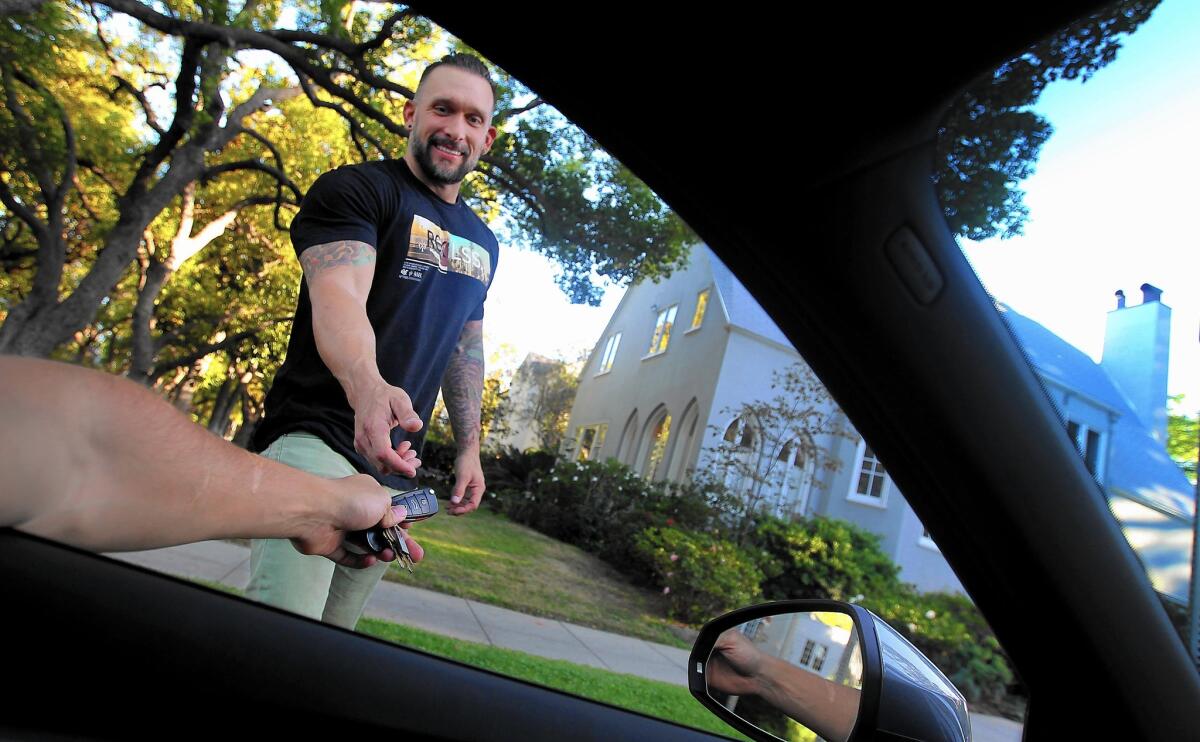Ride-sharing forces automakers to rethink how they sell cars

- Share via
For at least 22 hours a day most cars sit parked, sucking up their owners’ money while waiting to be driven. For most people, it’s one of their most underutilized — but most expensive — assets.
Now, some companies are devising ways to help people profit from their vehicles. Start-ups like RelayRides and Getaround help people rent out their cars during down time. Uber, Lyft and Sidecar connect car owners with people willing to pay for a ride. The rapid growth of these start-ups is transforming transportation — making it easier than ever before to get around without owning a car — and forcing automakers to devise new strategies to lure prospective buyers.
Last week, Ford launched a car-sharing program that offers buyers a new way to offset the pains of ownership by tapping into what is essentially an Airbnb on wheels.
And in Germany, General Motors launched a CarUnity app that lets owners of any brand rent their vehicles to Facebook friends or people in the app’s network.
“This is a big bang moment for the auto industry,” said Thilo Koslowski, vice president at research firm Gartner Inc., who estimates that by 2025, 20% of the vehicles in urban centers will be dedicated to shared use.
“Imagine all of a sudden 20% of your vehicles sales in the classic sense — to individuals who will be the only user of that car — go away,” he said.
Each vehicle that goes into a full-time car-sharing service, such as short-time rental company Zipcar, supplants four to six new car sales and postpones the purchase of up to seven more, said Susan Shaheen, a transportation expert and professor of civil and environmental engineering at UC Berkeley.
As people share vehicles, cars become “less sexy and more just transportation tools,” Koslowski said.
The ultimate effect on car sales is unclear. Population growth and a burgeoning middle class in developing countries are creating new customers at a steady clip. But sales could take a serious hit if people decide it’s cheaper to forgo owning a car in favor of renting or ride-sharing for the occasional errand.
“This will force the auto industry to rethink how it markets its products,” Koslowski said.
Automakers are positioning themselves to make sure new sources of cash flow their way. Rental programs are a way to introduce prospective consumers to their brand. And if you’re going to rent out a car, why not upgrade to a nicer one?
Mark Fields, chief executive of Ford Motor Co., said the automaker needs to start “thinking like a mobility company” as well as a manufacturer.
In its six-month test program, Ford’s auto financing arm is inviting customers in six U.S. cities — Berkeley; Oakland; San Francisco; Portland, Ore.; Chicago; and Washington, D.C. — and London to sign up to rent out their vehicles for short-term use.
The San Francisco car-sharing company Getaround will manage the program by screening drivers, collecting funds and providing a $1-million insurance policy. Getaround suggests a rental rate based on the make, model and location of the vehicle, but owners can set their own prices.
Rates are typically $7 to $12 an hour and include customer support and roadside assistance. Getaround takes a 40% cut.
In Bangalore, India, Ford is testing a fractional car ownership program with the car-sharing vendor Zoomcar. The companies have identified several three-person groups with complementary schedules, allowing each pod to share a single vehicle.
For some owners, the business can cover their car expenses.
Damien Breen, 38, rents his 2015 Audi A3 out 10 to 14 days a month, charging $59 a day through RelayRides. The Hollywood businessman works out of his house and uses ride-share services Uber and Lyft to get around if the car is out.
“It pays for 100% of the expense of my leased vehicle, including insurance, making it a free car for me to use two weeks a month,” Breen said.
Hayley Ortner, 26, makes about $300 a month through Getaround renting her 2015 Ford Fiesta for $9 an hour during the evenings and on weekends in San Francisco.
That covers the entire $276 monthly loan payment on the vehicle, said Ortner, a behavior therapist.
Milliennials are leading the trend, looking for wheels to supplement an otherwise car-free lifestyle, researchers say.
“People below the age of 30 are much more likely to identify with their mobile and computing devices than the cars,” said Arun Sundararajan, a professor of information, operations and management sciences at New York University. “Autos just aren’t the identity-making purchase that they once were.”
More than half of millennials report being open to sharing rides with others and rank car rides second only to book lending as things they are most open to sharing, according to a study from the Penn Schoen Berland research firm.
While automakers believe individual consumers will remain the primary sources of their business well into the future, they are hedging their bets.
BMW plans to offer an optional equipment package for cars from its Mini brand that will allow owners to share their vehicles. The company hasn’t detailed the technology, but it will likely give renters access to unlock and drive the cars through a smartphone app or other device.
“Society and the automotive industry are undergoing radical change,” said Peter Schwarzenbauer, who heads BMW’s Mini and Rolls Royce brands. “So it makes sense for us to offer a car-sharing option for Mini starting in 2016.”
Bob Carter, who heads Toyota’s sales in the U.S., says the company is gauging how car- and ride-sharing companies such as Uber will affect their business. In San Francisco, for example, “we will see business models develop around access to cars but not ownership,” he said.
Yet in other areas, including sprawling Southern California with its long commutes and decentralized employment, vehicle ownership will continue to drive the auto business, Carter said.
Many in the auto industry are skeptical that Americans are going to fully embrace ditching their wheels and start subscribing to car-sharing services anytime in the near future.
“I believe that the American love affair with cars is alive and well,” said Scott Painter, chief executive of TrueCar, the online digital car pricing service. “I think we can grow the pie. I don’t think we will see a decline” in car sales.
One thing is certain: the competition will be fierce.
Shaheen, the UC Berkeley professor, said there are 23 car-sharing companies renting 19,115 vehicles to service about 1.3 million members in the U.S. The industry is growing at about 35% annually, she said. Her data include only companies such as Zipcar, which owns its fleet and rents cars by the hour.
Other companies such as Getaround, RelayRides and FlightCar allow people who own their own cars to make peer-to-peer rentals. Although there is overlap, each of the companies targets a slightly different market.
RelayRides, for example, requires a minimum full-day rental. FlightCar is airport based. When people embark on a trip, they leave their car at the airport to be rented by a traveler to that city. Getaround is generally used for hourly access to vehicles.
But all have a common goal.
“Our mission as a company is to make cars less idle,” said Andre Haddad, chief executive of RelayRides.
Twitter:@latimesjerry







